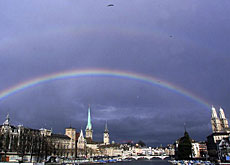
Zurich’s Right fears rise of “Koran schools”

Voters in Zurich are set to decide on controversial new laws that would lead to the official recognition of non-Christian faiths, including Islam.
But the proposals are being challenged by politicians from the Right, who have been accused of running an inflammatory campaign.
One of the most controversial parts of the new legislation, which is due to be voted on in a referendum on November 30, is a move towards recognising faiths other than the three official religions in the canton.
At the moment, canton Zurich only recognises the Protestant, Roman Catholic and the Old Catholic Churches. Under the proposals, other religions would be recognised as long as they fulfilled certain requirements.
But the move is being strongly opposed by members of the canton Zurich branch of the rightwing Swiss People’s Party and the centre-right Radicals.
The People’s Party claims that cantonal contributions – which are given to all recognised religions – would be used by Muslims for fundamentalist religious teaching.
Party literature even shows a montage of the Zurich Münster with its tower replaced by a minaret and the words “it’s a question of time”.
Criticism
Both the three recognised Churches and the country’s anti-racism commission have heavily criticised the campaign.
In a joint statement, the three Churches said that opponents’ assertions were simply not true, because funds were not given for religious lessons.
Gioia Weber from the Federal Commission against Racism told swissinfo that this was the case, adding that the Right’s campaign bordered on being racist.
“It’s surely not advisable to publish false allegations like those which say that ‘Koran schools’ would be financed by taxpayers’ money,” she said.
“Tarring whole sections of society with the same brush borders on discrimination; it’s unfair,” she added.
The three Zurich Churches say they have maintained a constructive dialogue with the city’s Jewish and Muslim communities for many years. They fear that the anti-Muslim sentiment voiced by the Right could damage this relationship.
Strict requirements
Funding for recognised religions is intended to support services that are of use to society as a whole, and from which non-members might also benefit.
Markus Notter, director of justice in canton Zurich, said that assertions that cash could be used for “Koran schools” were simply false.
He said there were strict requirements that needed to be met before a religious community could gain official recognition. These automatically rule out sects, splinter or fundamentalist groups.
The law for recognising religions sets out that among other things, a Church must carry out charitable activities. It is not allowed to have any political or economic goals.
The faith in question must also have been active in Switzerland for 30 years, be organised democratically, recognise the Swiss legal system and exercise religious tolerance. Financial transparency is also required.
26 different models
A study by the anti-racism commission has shown that the country’s 26 cantons differ greatly in their recognition of religions.
Some, such as Bern, Basel City, St Gallen and Fribourg, have already recognised the Jewish religion. Others only recognise Christian Churches.
Only in cantons Geneva and Neuchâtel are all religions treated the same. Other cantons have so far rejected such a move.
But some are looking into the issue, which could have consequences for both recognised and non-recognised religious communities – as the Zurich example shows.
Canton Zurich’s Markus Notter says that a rejection on November 30 would almost certainly result in the official recognition of the Protestant, Roman Catholic and the Old Catholic Churches being called into question, and renewed public debate on the separation of Church and State.
swissinfo, Jean-Michel Berthoud (translation: Isobel Leybold)
According to 2000 figures, 75% of people in Switzerland belong to one of the state religions – Protestant or Catholic.
10% belong to other religious communities.
State financing of churches in canton Zurich amounts to SFr50 million.
In 2000, 39.9% in Zurich were Protestant, 30.5% Roman Catholic, 5.3% Muslim, 2.4% Christian Orthodox, 0.5% Jewish.
Voters in canton Zurich are being presented with a change to the constitution and two laws on November 30.
The changes to the constitution mean that in addition to the three recognised Churches, other religious communities could be recognised by the state.
Another change is that the constitution would grant recognised Churches autonomy within the realm of cantonal law, and would also allow them to decide about the voting and election rights of its members, including whether they give the right to vote to foreigners or minors.
Canton Zurich is the only canton not to grant this right to foreigners. The “no” campaign is against the move.

In compliance with the JTI standards
More: SWI swissinfo.ch certified by the Journalism Trust Initiative
















![The four-metre-long painting "Sonntag der Bergbauern" [Sunday of the Mountain Farmers, 1923-24/26] had to be removed by a crane from the German Chancellery in Berlin for the exhibition in Bern.](https://www.swissinfo.ch/content/wp-content/uploads/sites/13/2025/12/01_Pressebild_KirchnerxKirchner.jpg?ver=cb688ed5)















You can find an overview of ongoing debates with our journalists here . Please join us!
If you want to start a conversation about a topic raised in this article or want to report factual errors, email us at english@swissinfo.ch.